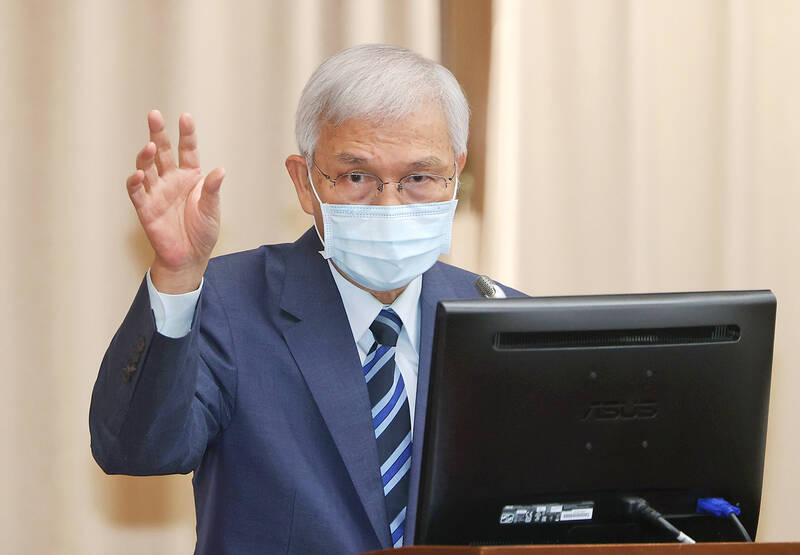Central bank Governor Yang Chin-long (楊金龍) yesterday reiterated that the bank would intervene in the foreign exchange market to maintain currency stability if necessary, but denied there is a so-called “Yang’s defense line.”
Yang made the statement at a meeting of the legislature’s Finance Committee where lawmakers from across party lines voiced concern over the New Taiwan dollar’s gradual, but steady decline against the US dollar.
“The central bank will step in when it spots abnormal fund movements that might threaten the currency market’s stability,” Yang told lawmakers.

Photo: CNA
The governor attributed the NT dollar’s performance to global fund outflows from Asian markets to take shelter in the greenback, after the US Federal Reserve last month said that it would keep interest rates up and for longer.
The NT dollar has fallen 5.01 percent against the greenback so far this year, a relatively stable showing compared with the yen’s 11.8 percent slump, the won’s 6.99 percent drop and the yuan’s 5.04 percent decline, Yang said.
Asian currencies saw greater corrections — from 7.67 to 25.66 percent — from 2017 to 2018 at the beginning of the US-China trade dispute when he had just assumed the governorship, Yang said.
The market has the final say regarding the local currency’s value, the governor said, adding that there is no so-called “Yang’s defense line,” although the market suspects that NT$32.4 is the level the central bank wants to maintain against the US dollar.
The NT dollar yesterday rose NT$0.003 from a day earlier to close at NT$32.325 against the greenback in Taipei trading, although it weakened to a seven-year low of NT$32.435 intersession, data from the central bank’s Web site showed.
Yang dismissed concerns that the US would put Taiwan on its watch list for unfair foreign exchange practices for supporting the local currency.
“The US Department of the Treasury frowns on interventions to thwart currency appreciation, but does not mind efforts to support the currency,” Yang said, adding that the US understands the importance of currency stability, and the central bank maintains good communication with the US.
Although Taiwan’s exports are taking a hit from a global slowdown, the nation has accumulated a trade surplus of more than US$20 billion, one of three criteria used by the US to weigh currency manipulation, Yang said.
Disappointing exports would weigh on Taiwan’s GDP and stock market, and foreign funds would move to realize capital gains whenever they see fit, Yang said.
Capital outflows have amounted to US$15.71 billion thus far, accounting for the rout on the TAIEX, he said.
The governor said fighting inflation remains the central bank’s top priority, but he is not overly worried about the second wave of inflation that is approaching.
It is unlikely that US consumer prices would reach new highs, even if international oil prices rise to US$100 a barrel, Yang said.
Rather, it would only slow the pace at which consumer prices return to the 2 percent target, he added.

SEMICONDUCTORS: The German laser and plasma generator company will expand its local services as its specialized offerings support Taiwan’s semiconductor industries Trumpf SE + Co KG, a global leader in supplying laser technology and plasma generators used in chip production, is expanding its investments in Taiwan in an effort to deeply integrate into the global semiconductor supply chain in the pursuit of growth. The company, headquartered in Ditzingen, Germany, has invested significantly in a newly inaugurated regional technical center for plasma generators in Taoyuan, its latest expansion in Taiwan after being engaged in various industries for more than 25 years. The center, the first of its kind Trumpf built outside Germany, aims to serve customers from Taiwan, Japan, Southeast Asia and South Korea,

Gasoline and diesel prices at domestic fuel stations are to fall NT$0.2 per liter this week, down for a second consecutive week, CPC Corp, Taiwan (台灣中油) and Formosa Petrochemical Corp (台塑石化) announced yesterday. Effective today, gasoline prices at CPC and Formosa stations are to drop to NT$26.4, NT$27.9 and NT$29.9 per liter for 92, 95 and 98-octane unleaded gasoline respectively, the companies said in separate statements. The price of premium diesel is to fall to NT$24.8 per liter at CPC stations and NT$24.6 at Formosa pumps, they said. The price adjustments came even as international crude oil prices rose last week, as traders

Taiwan Semiconductor Manufacturing Co (TSMC, 台積電), which supplies advanced chips to Nvidia Corp and Apple Inc, yesterday reported NT$1.046 trillion (US$33.1 billion) in revenue for last quarter, driven by constantly strong demand for artificial intelligence (AI) chips, falling in the upper end of its forecast. Based on TSMC’s financial guidance, revenue would expand about 22 percent sequentially to the range from US$32.2 billion to US$33.4 billion during the final quarter of 2024, it told investors in October last year. Last year in total, revenue jumped 31.61 percent to NT$3.81 trillion, compared with NT$2.89 trillion generated in the year before, according to

PRECEDENTED TIMES: In news that surely does not shock, AI and tech exports drove a banner for exports last year as Taiwan’s economic growth experienced a flood tide Taiwan’s exports delivered a blockbuster finish to last year with last month’s shipments rising at the second-highest pace on record as demand for artificial intelligence (AI) hardware and advanced computing remained strong, the Ministry of Finance said yesterday. Exports surged 43.4 percent from a year earlier to US$62.48 billion last month, extending growth to 26 consecutive months. Imports climbed 14.9 percent to US$43.04 billion, the second-highest monthly level historically, resulting in a trade surplus of US$19.43 billion — more than double that of the year before. Department of Statistics Director-General Beatrice Tsai (蔡美娜) described the performance as “surprisingly outstanding,” forecasting export growth